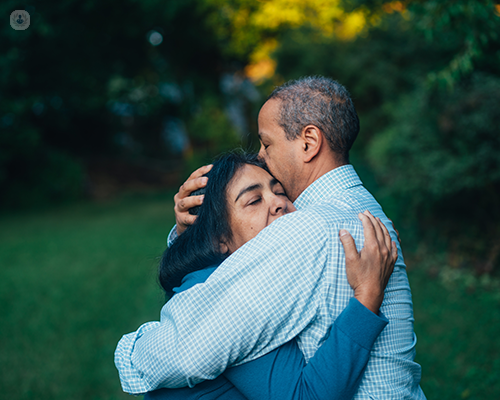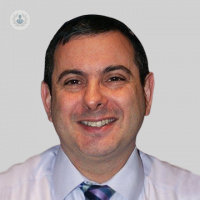Brain tumours: types, symptoms and outlook
Autore:Discovering that you, or someone you know, has a brain tumour is understandably scary and creates fear for the future. Dr Rees is a consultant neurologist who has trained extensively to look after patients with brain tumours as well as the neurological problems associated with cancer and cancer treatments. By reading his explanation, you’ll gain a thorough understanding of the types of brain tumours, the symptoms, treatment and overall outlook for patients with brain tumours.

What is a brain tumour?
A brain tumour is a collection of abnormal cells that grow in the brain or in the skull and eventually cause symptoms. There are over 120 different types of brain tumour.
What are the different types of brain tumour?
There are two main types of brain tumour:
- Those that grow from the brain itself or the linings of the brain known as primary brain tumours.
- Those that spread from cancers in the body known as secondary brain tumours or brain metastases.
Primary tumours can either arise from abnormal cells in the brain (the most common of these are called gliomas) or from abnormal cells in the lining of the brain (the most common of these are meningiomas). This is a very important distinction as gliomas cannot easily be removed because they grow within normal healthy brain tissue, whereas many meningiomas can be completely removed and cured. Benign brain tumours grow slowly and can exist for many years without causing any major problems. On the other hand, malignant tumours are rapidly growing and can be fatal if not treated quickly.
What are the symptoms of a brain tumour?
Brain tumours cause many symptoms but it is important to realise that there is no single symptom which identifies the problem as a tumour. If the tumour grows rapidly or blocks fluid circulation within the brain, it may cause symptoms of raised pressure including headache, blurring of vision, double vision (diplopia), vomiting, unsteadiness and drowsiness – these symptoms being more common in children than in adults.
Some tumours, particularly those that grow slowly, can cause epileptic seizures – these can be ‘partial’ or ‘generalised’ where there is a loss of consciousness. Some partial seizures are difficult to diagnose as they are short-lived and may feel like a panic attack. Other symptoms include a gradual loss of intellectual functioning as well as memory, speech and language abilities. The tumour could also affect the ability to cope with usual daily activities.
Very rarely, a brain tumour can manifest as a psychiatric illness with depression, apathy and change of personality. With ever-increasing access to brain scanners, more and more tumours are being picked up incidentally without causing any symptoms at all and can lead to tremendous anxiety. Brain tumours that grow out of the pituitary gland, which hangs at the base of the brain, can cause hormonal problems.
How is a brain tumour treated?
Brain tumours are treated according to where they are in the brain and the type of tumour:
- A benign tumour that is picked up incidentally will often not need any treatment.
- A malignant tumour may need urgent surgery followed by radiotherapy and chemotherapy.
Brain tumour surgery has advanced massively over the last few years, partly due to improvements in imaging the tumour and guiding the surgeon in the most accurate way. Surgery can be performed in several ways
- A small sample or a biopsy can be taken for deep-seated or extensive tumours.
- Other tumours in important parts of the brain can be removed with the patient awake during the operation to minimise the potential damage.
- Some tumours can be removed with an endoscope, such as through endoscopic skull base surgery.
- Some tumours can be removed entirely from the lining of the brain.
Radiotherapy is used for benign and malignant tumours and can be given as a course of small doses over a number of weeks (fractionated) or as a single dose (stereotactic radiosurgery) e.g. Gamma Knife ®.
Certain tumours, particularly in children, can be treated with Proton Beam Therapy which is only available in certain locations and reduces collateral damage to other parts of the brain and organs in the body.
Drugs are of use for certain brain tumours as they improve the survival when added to radiotherapy – these are usually tablets called temozolomide or lomustine. Other more experimental methods of treating brain tumours include gene therapy, laser-guided therapy and vaccinations.
What is the long-term outlook in cases of a brain tumour?
The long-term outlook depends on
- the type of brain tumour
- whether it is benign or malignant
- whether it can be operated on
- whether it responds to radiotherapy and chemotherapy
- the age and general condition of the patient – in general the younger the patient and the fitter, the better the outlook
Many brain tumours are unfortunately fatal in the end. Primary brain tumours account for approximately 2% of all cancers in adults and 20% in childhood. There is a 25% chance of any adult patient who has a brain tumour dying from it. In adults, deaths from brain tumours are second only to stroke as a cause of neurological death. They place a considerable burden of suffering on patients, their families and carers. However, with advances in treatment, the outlook for gliomas, which are the most common type of primary brain tumour, has improved considerably over the last ten years.
Click here to learn more about how Dr Rees can help you and to arrange a face-to-face or online video consultation.



